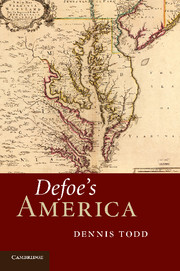Book contents
3 - Servitude and self-transformation in Colonel Jack
Published online by Cambridge University Press: 02 December 2010
Summary
The paradoxical language of slavery and freedom was traditional in religious and ethical discourse, and its source was the Bible, whose rich body of figuration for the experience of sin and redemption was drawn from the ancient Hebrews' slavery in Egypt. Defoe and his English audience inherited this language, but, beyond the captivity narratives of New England or tales of enslavement by Barbary pirates, there was little in the world they experienced that could concretely body forth a narrative allegory or a system of symbols, emblems, and metaphors for the traditional sense of sin and deliverance. One exception was indentured servitude, a form of bondage endured by hundreds of thousands of British subjects.
The story of Crusoe's punishment and deliverance begins with a brief episode of Barbary captivity that proleptically identifies his experience on the island as a kind of slavery. Once Crusoe is on the island, however, Defoe uses the patterns of indentured servitude to plot out his protagonist's life, and he exploits the symbolic possibilities of New World servitude and mastery to give resonance to Crusoe's spiritual and psychological growth. Still, indentured servitude is a figure in the novel: Crusoe is like an indentured servant. After Robinson Crusoe, Defoe uses indentured servitude to shape the psychological, moral, and religious progress of his protagonists, but now literally. Moll and Jack come to the New World as actual indentured servants and end as masters of actual plantations.
- Type
- Chapter
- Information
- Defoe's America , pp. 76 - 117Publisher: Cambridge University PressPrint publication year: 2010



